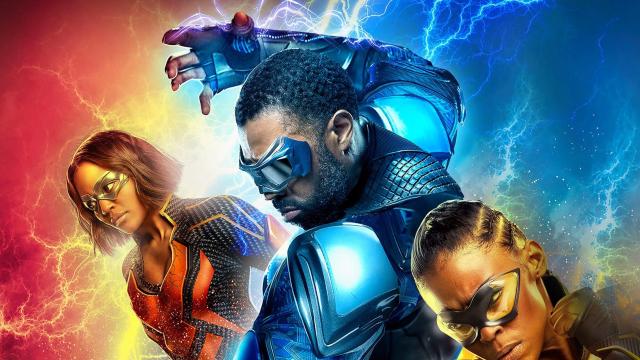In Black Lightning’s third season, the city of Freeland became a new kind of war zone as the American Security Agency and the nation of Markovia set out to turn our heroes’ hometown into a profitable source for the world’s growing demand for living, metahuman weapons. Together with his vigilante daughters Lightning and Thunder, Black Lightning was able to bring some semblance of peace back to Freeland, but not without everyone paying a tremendous price in the process. Let’s catch up on season four, shall we?
For the past few weeks, Black Lightning’s fourth and final season has been chronicling the Pierce family’s attempt to pick up the pieces of their lives at a time when it feels like the world’s pressing in on them all in different ways, now more than ever before. Like a lot of network TV superhero shows with a clearly defined end in sight, Black Lightning’s been shifting gears to slow down and let you appreciate the journey it’s taken its core cast of heroes and villains on. But these past few episodes of Black Lightning have been rough, not in terms of quality, but the new depths of emotional turmoil it’s put everyone through.
[referenced id=”1531475″ url=”https://gizmodo.com.au/2020/11/black-lightnings-4th-season-will-be-its-last-on-the-cw/” thumb=”https://gizmodo.com.au/wp-content/uploads/2020/11/21/dj8ugewcjbtktx1pwasp-300×169.jpg” title=”Black Lightning’s 4th Season Will Be Its Last on the CW” excerpt=”Hot off the news that Black Lightning’s reformed assassin Painkiller may star in his own spinoff series, the CW’s just announced that Black Lightning itself is coming to an abrupt end.”]
Black Lightning’s fourth season opened with a small time jump a year into the future, when most everyone was shaken by, but recovering from, the Markovian invasion that culminated in the death of police chief Bill Henderson (Damon Gupton). Even though Jefferson Pierce/Black Lightning’s (Cress Williams) combined efforts with his daughters Jennifer/Lightning (China Anne McClain) and Anissa/Thunder (Nafessa Williams) were enough to thwart the Markovians and expose them to the government, Henderson’s death was a breaking point for the Pierce family that let loose many of the personal demons they’d been keeping at bay.
With Markovia denying any involvement in what happened in Freeland and the American government uninterested in pressing matters further, Freeland settles into a new normal as the season’s first episode unfolds in ways that hearken back to the series’ roots. In absence of the ASA and with the police force in shambles, Freeland’s gangs like the 100 and the Kobra Cartel are free to wage turf wars with one another as citizens do what they can to make it through the day unharmed. The constant violence in the city is why both Lightning and Thunder have continued to use everything they learned from their father and their uncle, Peter Gambi (James Remar), in their neverending patrols to keep the gangs in check. But with the police also taking their frustrations out on citizens and arming themselves with next-generation weapons designed to kill metahumans, Jefferson himself can’t help but feel that there’s no longer a point in playing hero because it’s a life that can only lead to pain and death.
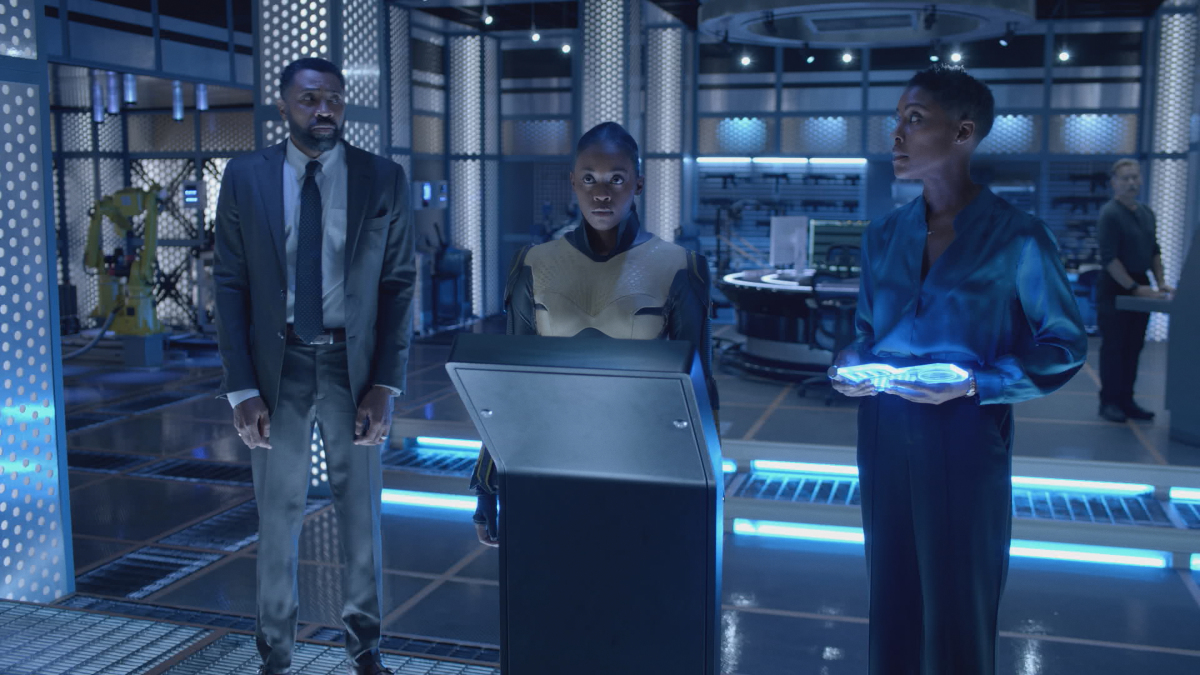
While Jennifer and Anissa have been busy doing what they can to keep the streets safe, Jeff’s pulled back entirely from his Black Lightning activities in what’s felt like a mix of inwardly focused guilt and shame, but also resentment and anger toward everyone around him, particularly his wife, Lynn (Christine Adams). After Lynn became addicted to Glimmer, the Green Light-derived drug that granted users temporary metahuman abilities, the longstanding tension between her and Jefferson became that much deeper. That’s in large part because of the years Lynn spent demanding that Jeff give up vigilantism in order to shield their family from harm. Much as Black Lightning’s turned Lynn’s recent character arc into one about substance abuse and recovery, season four’s dug deeper into her interiority through a series of tense, but compelling counseling sessions with Dr. Bowlan (Bethann Hardison), who she’s visited both with and without Jeff on multiple occasions.
In addition to the garden-variety relationship issues you might expect traumatized people to experience — a lack of romantic or sexual intimacy, for one — what comes out of Lynn and Jeff’s sessions is a discussion about the difference that’s been gradually straining their bond. While Jeff’s only been able to see Lynn’s Glimmer use as mere addiction, to her, the drug represents a kind of power and protection that the family lost when Jeff gave up being Black Lightning. The show doesn’t try to shy away from the reality that Lynn definitely enjoys the literal sensation of being powerful and able to take on whatever strange metas or trigger-happy cops she crosses paths with, but it also attempts to make you understand what would drive someone to seek out that kind of feeling beyond immediate dangers.
Hard as it is for Jeff to hear it, it’s infinitely harder for Lynn to admit to feeling alienated from her family as the sole member borne without a meta gene, seemingly the only thing people can rely on to keep them safe in Freeland now. Strong as the love between Jeff and Lynn is, Black Lightning repeatedly delves into the messy truths of how one’s people holding them down can at times feel like one’s people holding them back. While the two things aren’t mutually exclusive, the key to being able to navigate these situations is being able to communicate. Though Jeff and Lynn going to counseling creates the appearance of the two of them listening to one another, Black Lighting asserts that listening and understanding are two different things, and in moments where the Pierce family’s been apart from one another, you can see how they’re all still working on both skills.
Long before Jefferson’s rage and frustration with his life pushes him back into the habit, Black Lightning first showed a shift in his worldview with a scene that echoed Elijah McClain’s 2019 killing at the hands of Colorado police. When Jefferson witnesses a cop car roll up on a Black boy walking down the street armed only with a violin, he immediately gets out of his car and intervenes as the cops begin harassing the kid, clearly intending to harm or murder him. It takes everything he has to not let his instincts kick in and zap the officers on sight when they train their guns on him, and you can see that, despite everything Jeff’s been through, he does still default to Black Lighting’s code of generally avoiding taking lethal shots at baseline humans.
At the same time, though, he’s not exactly the same Black Lightning he was back in season one, and after briefly considering that he could just walk away, he ultimately decides to let his fury out on the police, electrifying the pair within an inch of their lives and making sure to blow their cruiser up in order to cover his tracks. Even though he also goes the extra mile of knocking the power out on an entire city block, perhaps to ensure that anyone recording him lost their footage, Gambi, who isn’t exactly working closely with Jeff these days, still has to duck in and clean up trace amounts of digital evidence that would tie the explosion to Jeff, who was in his civilian guise at the time. If the Pierces and their allies spent more time talking to one another, they’d likely recognise the dangerous, and at times self-destructive behaviour they’ve all been engaging in to cope with their losses.

As for Thunder and Lightning, it’s clear that Anissa’s thrown herself into her work in order to distract herself from the reality that her wife Grace Choi (Chantal Thuy), a shapeshifting meta, might not wake up from her coma. Jennifer’s descent into and rise out of grief came to the fore with Khalil’s (Jordan Calloway) transformation into Painkiller last season, but this season makes clear that, in addition to those emotional hurdles, Jen’s also become unmoored in a more existential sense. Though she’s the newest at being a superhero, Jen’s unique powerset and the speed with which she masters it sets her apart from her sister and father in ways she can’t really express throughout much of season four’s first few episodes, which show you just how formidable a force she’s become. Unlike Jefferson, whose improved skills at channeling electricity he absorbs still read as being physically taxing, Jen demonstrates that she can use her generative power to replicate her father’s powers and then some with few limits.
Jen recklessly wields her powers throughout “The Book of Reconstruction” in a way that puts her in danger while on missions, and also draws the attention of villains like Latavius “Lala” Johnson (William Catlett), the 100’s leader. The reasoning behind her cavalier approach to heroics, though, is an interesting one. Having become used to flying much higher up into the Earth’s ionosphere than Jefferson ever could, Jen learns that she’s able to absorb raw energy, healing her body (and costume, somehow) from most traumatic damage. From her perspective, this newfound aspect of her powers is an invaluable asset in their fight that makes her invincible in a way that her sister can only be temporarily. However, Lynn, Anissa, and Jeff can only see Jen’s trips to the ionosphere as a manifestation of the family’s addictive behaviour.
There’s both truth and projection in the family’s responses to Jen’s behaviour this season, as none of them want to admit that they have been desperately seeking ways to avoid confronting the difficult emotions tying them up inside. Their unwillingness to be honest pushes Jeff in particular into a dark — and at times tonally comical — space, as he becomes involved in a new underground ring of live-streamed cage fights orchestrated by Lala. As Jeff wrestles with nightmares and takes comfort in Black Lightning’s answer to Fight Club (that includes him brutally breaking a man’s leg), Lightning strikes out on her own to handle smaller-scale gang conflicts that raise her profile as a hero in positive and negative ways.
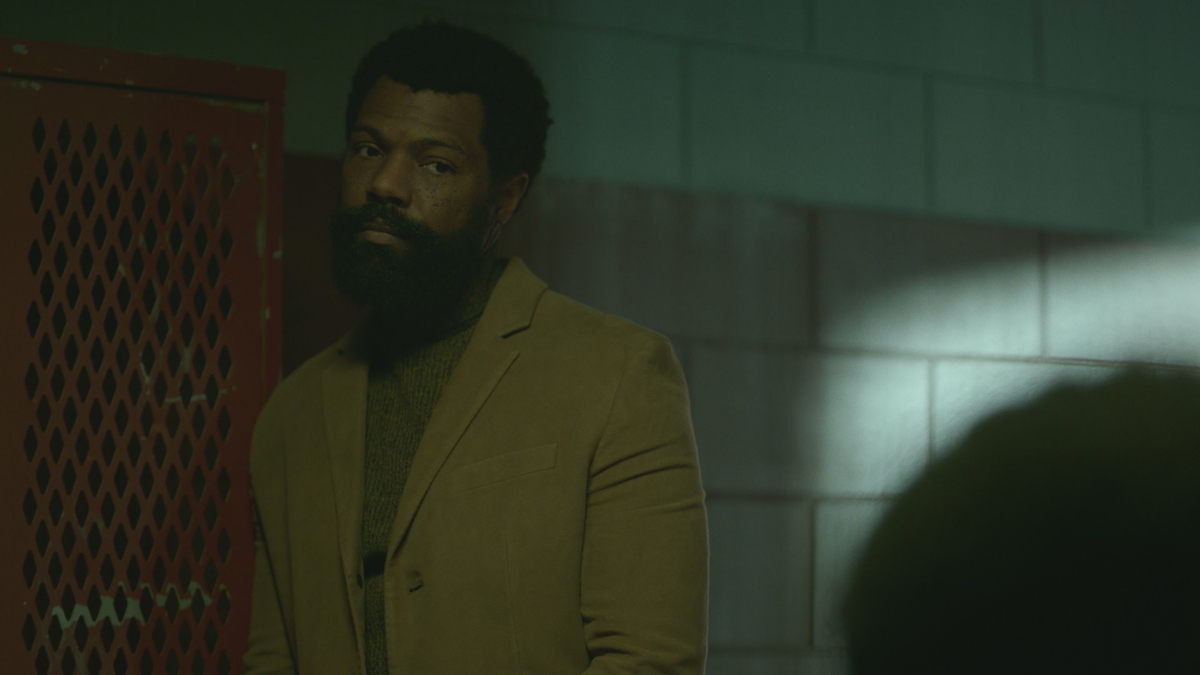
When a civilian is murdered in a shootout Lighting attempts to stop, she becomes part of a new anti-metahuman and anti-vigilante narrative pushed by reporter Rebecca Larson (Amanda Baker). There is no way that Jefferson could have prepared his daughter to handle being put in the spotlight due to altered, incriminating footage being published in a time when information spreads faster than fully informed opinions can take shape. But Black Lightning posits that being put on public trial is one of the things Jeff might have been able to shield Jennifer from had he been more present instead of wallowing in his own self-destructive troubles. The same is true of Lynn who, in addition to her self-experimentation, becomes wrapped up in a thorny workplace drama with the all-newly-electricity-proof Tobias Whale (Marvin Jones III), who’s reinvented himself as a patron of Freeland.
In the grand scheme of things, Anissa’s been the most successful in her relatively grounded goals of establishing a neutral zone in Freeland where the city’s unhoused population can get back on their feet without fear of being caught in gang violence. Operating a Blackbird, she’s been able to reach an agreement with the Kobra Cartel and the 100, and in her personal life, the wins keep coming when Grace wakes from her coma more or less ready to pick her life right back where she left off: ready to begin living together with Anissa as a married couple. It’s not so much that Anissa’s love for her wife ever wavered, but a year’s a significant amount of time, and while the two women quickly begin cohabitating again, they can both feel how the passage of time has created a rift that needs addressing, especially on Anissa’s end.
While everyone was rather distracted by the MCU’s foray into whimsical, heartbreaking, marital bliss in WandaVision, Black Lightning was already doing some impressive work telling a slightly different kind of marriage story. In addition to Anissa and Grace’s newlywed woes, old wounds for Jeff and Lynn reopen as they butt heads and let their pent up frustrations out in the open in earnest. Jeff doesn’t just suspect that Lynn may be romantically involved with Tobias, he truly feels that she’s willing to risk their family’s lives in order to get a taste of what it means to be a metahuman. Lynn doesn’t exactly know what her husband gets up to when he disappears for clips at a time, but knows that he’s not where his children have needed him in dire moments, and no excuses he can come up with justify his not being there.
Meanwhile, Freeland as a whole is rocked as new police chief Ana Lopez (Melissa De Souza) makes clear that she intends to rid the city of any and all metahumans, vigilante or criminal. But the familial drama comes to ahead when Jennifer, now a high-profile target of Lopez’s mission, witnesses her father on one of the live-streamed cage fights, which quickly leads to the entire family confronting one another about what they’ve all been up to. As Jefferson and Lynn come to realise that it’s in their best interests to work together because Tobias, a known villain, can’t be trusted, Jennifer’s life takes a dramatic turn as she, Anissa, and Grace become embroiled in a scandal involving the death of Freeland’s mayor. In the chaos of the 100’s attack on Freeland’s neutral zone, it’s easy for Lopez to pin the blame for the mayor’s death on Lightning, who, though all off Black Lightning’s past few episodes, has been taking on more than she can put out in return. In DC’s comics, Jennifer Pierce also possesses the ability to transform her body into a purely energetic form that gives her a distinctive appearance. Black Lightning’s take on her transformation happens under somewhat different circumstances, but to similar narrative import.
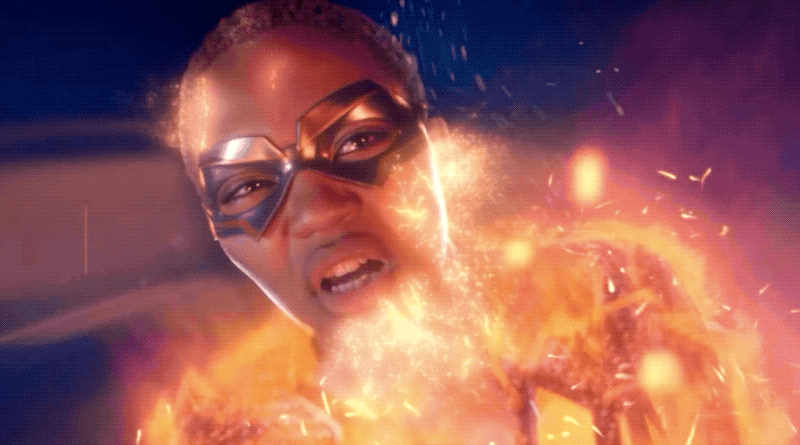
After the incident in the supposed neutral zone, Jen flies up into the ionosphere once more and begins absorbing energy into herself much like one Agatha Harkness (or Jean Grey if we’re being honest). And in a very Dark Phoenix-like way, she explodes into a blinding flash of particles as technopath T.C. (Christopher A’mmanuel) looks on in horror. Jefferson’s able to harvest his daughter’s dispersed particles and funnel them into a machine of Gambi’s making that he believes can being her back to life, but the entire experience highlights how Team Black Lighting has truly been dropping the ball on the home front. Tragic as Jen’s initial destruction is, it’s also a reminder to Jeff, Anissa, and Lynn that there are things still worth fighting for in Freeland, and with Lopez even more determined to exterminate the city’s metas, it’s going to need heroes.
Black Lightning seems to be setting itself up for a more ground-level finale given the way that the show frames the police once again as Freeland’s most pressing enemies. At the same time, though, it also feels as if the series might have plans for some its characters beyond Black Lightning’s finale, which may be the case for Jen, who emerges from Gambi’s machine in the most recent episode’s final moments. It’s not unheard of for series regulars to be recast part-way through a show’s run, but it’s rather interesting that the Jen who emerges from Gambi’s pod is portrayed by a different actress: Laura Kariuki, following McClain’s exit. Jennifer’s phoenix-life rebirth could simply be Black Lightning’s way of conveniently moving along with the bulk of its intended plot that couldn’t be reworked without one of the show’s core characters — or a sign that the next few episodes could have far-reaching implications for upcoming series like Painkiller set to debut on the CW in the future.
Though this week’s title, “The Book of Ruin: Chapter Two: Theseus’s Ship,” immediately brings WandaVision’s foray into existential philosophy to mind, the episode really illustrates clearly how this season’s been an exploration of people dealing with trauma as a family. While so much of what’s been happening to the Pierces lately has felt personal and specific to them — something that made it easier for them to withhold from one another — Jen emerging from the pod as a physically different person alarms her family because they don’t know what the change will mean for them as a unit. Unlike Grace and T.C., who both take in the new Jen with relative ease, neither Lynn nor Anissa can conceal their uncertainty as they comfort Jen, whose devastation is most understandable in that moment.
Jeff, though, can barely bring himself to look at, much less speak to Jennifer as her new self. As he walks away to clear his head, you get the sense that while he’s aware he’s hurting her, he’s genuinely not trying to. Pacing-wise, “The Book of Ruin: Chapter Two: Theseus’s Ship” stumbles in a few moments, but actually does a solid job of addressing the recasting by having its characters address it head on. Black Lightning throws a bone to comics nerds by having him consider the possibility that “JJ,” as she’s going by now, might potentially be a being from another reality merely claiming to be his daughter (he has seen some things recently, after all). The rest of the family is quite certain of JJ’s identity both because of Grace’s enhanced sense of smell and because of the multiple tests Lynn runs on her daughter confirming that she’s a genetic match to her previous self. When Lynn takes a moment to explain to JJ how a person’s physical appearance is determined by the expression of a person’s genes rather than “just” their DNA, it’s a bit of a basic biology lesson, but it also comes across as Black Lightning’s way of acknowledging the physical diversity that often exists within Black families.
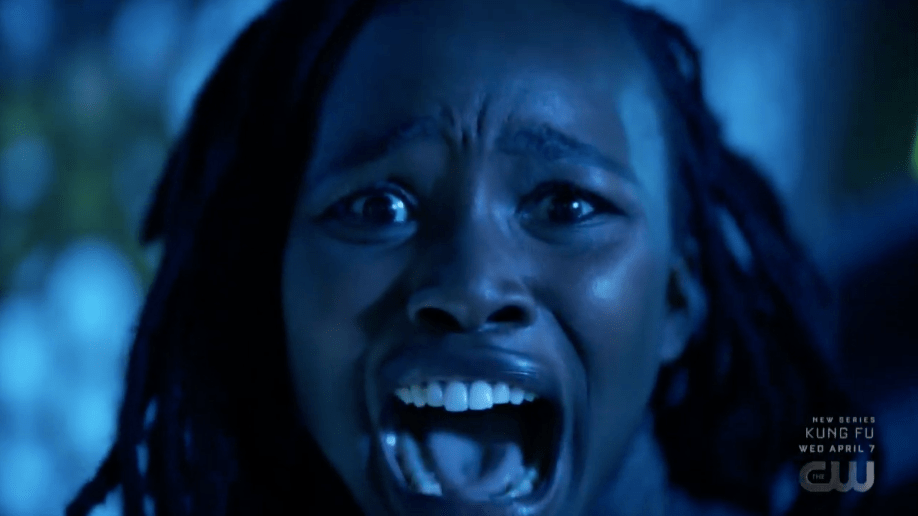
Much as JJ’s arrival throws everyone’s lives for a loop, it also works to everyone’s benefit, as Lopez and the newly-appointed head of Freeland’s Meta Task Force, Hassan Shakur (Wallace Smith), have identified Lightning as public enemy number one. In addition to the police seeking to destroy all of the city’s metas, Tobias, who does have designs on Lynn, is willing to do whatever it takes if it means keeping her under control to bend to his whim, including harming her family. Plus, posing as JJ gives Jen a certain level of anonymity that may benefit her by the series’ end, but Black Lightning posits that hiding one’s identity isn’t always enough to protect them by showing you how low Lopez is willing to go to accomplish her goals.
Both because the previous mayor was assassinated and because of Lopez’s desire to take control of Freeland, the police begin cracking down even harder on citizens. This episode follows as a pair of cops with a no-knock warrant who carry out Lopez’s larger mission of shooting first and asking questions later. In what’s become Black Lightning’s standard way of shifting into rather direct social commentary with stories pulled from the headlines, you see two white cops briefly express an unrealistic level of apprehension about breaking into the home where a Black couple is sleeping. The cops, of course, break into the house guns blazing, and the way the man of the house rushes to grab his own gun is both understandable and acknowledged elsewhere in the episode when Jefferson mulls over the reality that most people in Freeland own guns for protection.
Black Lightning does not explicitly invoke Breonna Taylor’s name as the scene unfolds over H.E.R.’s “I Can’t Breathe,” but the episode’s intention is clear as the woman of the house dies in the gunfire, and the scene cuts to shots of civil unrest in the city afterward and a memorial service. The series’ commitment to using genre to draw the public’s attention to real-world anti-Black racism and police brutality has always set it far apart from the CW’s other superhero series. While the show hasn’t lost its edge, its cancellation does make one wonder if audiences have really appreciated what they have been trying to do with its story.
“The Book of Ruin: Chapter Two: Theseus’s Ship” lets you sit with the gravity of the innocent, unarmed woman’s death for a beat before rewinding back in time to show you an alternate series of events that become the text of the show: Black Lightning intervenes during the shootout, neutralising the police, and keeping everyone alive. Though that entire sequence comes dangerously close to feeling a bit like the sort of cop-out that Black Lightning itself has snubbed its nose at, it also works to convey Jefferson’s perspective on the situation in Freeland as someone who’s committed his entire life to protecting it.
The anger that Jefferson’s felt this entire season has turned him into a harder, more difficult person to root for, particularly in moments when he’s shown his arse to those who’ve always had his back, like Jen. It hurts JJ to think that her father might no longer love or trust her because of an admittedly drastic physical change, but after T.C. inadvertently reminds her what sort of person she was as Jen, and that she can still be as Lightning, JJ makes the questionable decision to get back into the superhero game just in time to save her father. It’s always been clear that the Pierces are at their strongest when they’re standing together and clearly understand who actually means them harm (in this case, that’s most obviously the police).
Jefferson finally taking the time to sit and have a heart-to-heart with JJ gives us a hint that Team Black Lightning will be back in full force, and they’re going to need their shared strength because of what’s coming their way — things like Tobias Whale becoming mayor. Black Lightning hasn’t really spent all that much time piecing together what the next phase of Tobias’ villainous plan for domination is, but with killer cops on the loose and few heroes left capable of defending Freeland, Jeff and the rest of the team are going to have their work cut out for them going forward.
